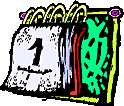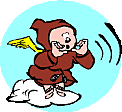With The Commentary of the RABAM

Raboisai,
I start today’s drasha with a sad and embarrassing admission—my own
personal viduy in front of you, you minuval.
Vidui = Confession. During Yom Kippur this is a communal recital of an entire litany of nice sins to choose from, at other times sin is confessed by onesies and twosies.
Over Chol Hamoed Pesach I was driving my einiklach to the pick up spot for the rabbinically sanctioned avoidah zorah—idol worship -- known as Six Flags Great Adventures. Along the way, I dropped a quarter in the car. Since it is a Chiyuv Dioraisa, a biblical requirement, to pick up loose change, I reached down to the floor to retrieve the quarter, and behold—I found half an M&M. It was this moment of temptation that started off a terrible cycle of sin and debauchery not unlike being mezaneh with an underage Parah Adumah.
Chol HaMoed Peysach = intermediate days of the festival, between the two first days and the last day. It is prohibited to conduct any business on the intermediate days, even though they are not actually full festival days. But the Gemara does allow one to engage in business to prevent a loss (davar ha’aved), though several commentators specifically exclude not making a profit as justification. The Rambam (in Hilchois Yom Toiv) further clarifies that what is meant is the purchase of something one needs (especially for sustenance or celebrating the yom tov), and purchases which, if delayed till after the holiday, would cause a loss or damage, or would cost more and so entail a loss.
Buying something on chol hamoed which one will sell later at a higher price is definitely not davar ha’aved, and engaging in normal work or labour is frowned upon - one is, according to the Ra’avad, not permitted to work for profit. But a person whose livelihood depends upon working during chol hamoed is permitted, excepting working the land (avoidas karka), and excepting regular transactions which qualify as normal weekday transactions.
In discussing this issue, the exceptions and examples mentioned in the Mishna, Gemara, and the Shulchan Aruch are caravans laden with goods coming to town, and merchant boats, but the Rama also includes wholesale merchants (tagar) whose business depends on constant turnover to continue selling, provided they do it discretely, and others hold that if there was reason to fear losing one’s business or livelihood by closing during chol hamoed, it is permitted to the extent that business or livelihood are maintained.
Avoidah zorah = heathen behaviours, idolatry. Rabbinically sanctioned avoidah zorah = the rabbis stress family harmony and peace, wherefore it
is necessary sometimes to indulge the children. But note that after the oldest child has become a bar or bat mitzvah, and is technically an adult, the imperative to give in to their whiny blackmail lessens - their leading representative has become an adult, and can be co-opted in controlling them. A child with a whip is a wonderful thing.
Chiyuv d’oiraisa = a requirement presented in the Toirah, rather than one based on a ruling by the sages of the Talmud.
Mezaneh = too close for discomfort; congress of the flesh. Parah Adumah = Red heifer, the sacrifice of which yields purificatory materials used to rehabilitate certain types of sinners, or rededication.
An underage parah adumah = A red calf, a fine young heifer. In the category of first fruits; cheesecake. You naughty animal.
Yes, at that moment, I was taken by an incessant urge to bite into the forbidden delicacy and indulge in the chometz delights of a treat that is crispy on the outside, chewy on the inside, and unlikely to lead to hours of painful stomach cramps. And as you know so well, you mamzer, Aveirah goreres Aveirah, one evil deed begets another...
One M&M, of course, is never enough. After dropping off the einiklach, I
got down on my hands and knees and prostrated myself on the floor of the
station wagon with the same fervor with which I had cleaned out the car one week earlier, searching for just one small bite of chometz. Boruch Hashem I found two crushed Cheerios in the ashtray, which I consumed immediately.
Alas, the Yetzer Harrah caught me on a weak day.
Yetzer HaRa = the evil inclination. Man has two inclinations; the Yetzer Tov which inspires his most noble tendencies, and the Yetzer HaRa which causes him to fail or sin. Every aveira is blamed on the Yetzer HaRa. Many men know less about their Yetzer HaRa is than their wives do; most women become experts in the subject, and will shop-talk about it for hours - often with the mother and sisters of the guilty party.
Still craving the delicious taste of chometz, I rushed home, and Boruch Hashem, no one was there. I headed straight for the kodshei hakadoishim of chometz, the vacuum cleaner. Would the bag containing all the crumbs of recent weeks of cleaning still be inside? I prayed to the Aimishteh for it—and it was so. My Bashert, so busy spending her days teaching a class in Bais Yankif, her evenings serving as the mikvah lady, and her nights working at the 24 hour Kinkos, had forgotten to remove the lest vestiges of chometz. The careless bitch.
Chometz = yeastables forbidden during the eight days of Peysach, usually removed in a massive cleaning project during the week leading up to the seder.
Boruch HaShem = Blessed is G-d, meaning contextually in this case ‘thank
heavens’, but echoing the preamble of most blessings said when performing mitzvos or engaging in behaviour which we are obligated to consider sanctified, such as saying the blessing over foods and after eating. There is no particular blessing for vacuum cleaner bags, most Rabbis are meikel the issue, Boruch HaShem.
Kodshei hakadoshim = the holy of holies.
Aimishteh = HaKedooshBoruchHoo; a referent to the ineffable name.
Bashert = one’s mate or match (Yiddish, from a Germanic root).
Bais Yankif = A chain of all-girls ultra Orthodox educational institutions.
Mikvah lady = the woman who assists at the mikvah. Mikvah = a pool for purifying, as required under several conditions. A ritual bath. Mediaeval Jewish communities would arrange for two things before anything else: a mikvah and a school; thus seeing to purification of women and utensils, and education of the young in particular and the community in general (hence the terms shul, school, for synagogue).
With great satisfaction I dove into the vacuum bag. Breadcrumbs! Leftover pieces of cookie! It was the most fun I’ve had committing an aveirah since my chavrusa and I studied the true meaning of “abomination” for extra credit back in high school, if you know what I mean. The utter joy of eating straight from the bag was only slightly tempered by the big lump of lint that got stuck in my throat.
Chavrusa = study partner; one’s lehr-chaver.
Abomination = a fascinating subject; I suggest you ask your political representative for instructions, or refer to many of the delightful illustrated manuals available at the all-night bookstores in neighborhoods other than your own.
After coughing up the fuzz ball, I became deeply troubled. I needed more chometz! I wouldn’t dare go down to the basement to attack the food storage, since the goy who bought the chometz might show up at any moment and demand that which he rightfully paid for. The anti-Semite.
It is customary to sell all chometz one owns to a gentile before Peysach, in order to make certain that one has no chometzdikkes in one’s possession for the duration of the festival. The sale has to be in all ways legitimate: the price has to be a fair one for the material being sold, the ownership of the material is with the gentile after the sale, and the gentile must have access to the material in order to use or enjoy it - you don’t have to be Jewish to love Levi’s rye bread. In apartment buildings one can claim that the basement, not being actually part of one’s own dwelling, qualifies as a courtyard or common area, and thus that the storage of chometz is not on one’s own premises.
Anti-Semite = a Gentile who is resentful of the inherent sanctity of a priestly nation, a jealous goy, a person who does not agree with us, or a politician who shamelessly goes after the avoidah zoro vote. An affectionate nickname for a non-Jew. A neighbor who does not turn his television up on shabbes, especially if the Yankees are playing, paskudniok!
I had one more chance. I knew that with all of the pre-Yuntif mayhem, my
bashert likely forgot to vacuum the upholstered dining room chairs. I rushed to the dining room, got on my hands and knees next to the first chair, and positioned my head above the crack between the seat cushion and the wood chair-back.
Pre-Yuntif mayhem = many wives redecorate in part or in whole in the weeks leading up to Peysach, others are content to merely see if this chair goes better here, or in that corner. What about this painting? A new light fixture?
Do not go on business trips in the last two weeks before the holiday - when you get back, you will not recognize your house, and your aishes chayil will be bitterly resentful that You! Were! Not! Here! To! Help!!!
The only thing worse than a self-hating Jew is a me-hating Jew who keeps talking on the phone with her yenta of a sister in Lakewood.
And that’s when my wife walked in. She shrieked in her loudest Ball-ha-Buster voice, “Pinky, how many times have I told you not to put your tongue in a strange place??!!”
So went my Chol Hamoed Pesach.
Ball-ha-buster = a) Baleboste, from Baal (master) of the Beis (beis, beit = house, establishment), with a feminine post-fix; the wife. b) Beitza-brecher.
This maiseh shehoyo is indeed reminiscent of a halacha brought down by the Kley Yukkur in his seminal work, Tzeddek Tzeddek Tirdoif,” loosely translated as “Never miss an opportunity to judge others.”
Maiseh shehoyo = an anecdote drawn from life.
Halacha = a law, the law.
Kley Yukkur = Rabbi Efrayim Shlomo Ben Aharon of Luntshitz in Poyland (b.1550 - d.1619), after the name of his most known book ‘the precious pot’ (keli, kli = vessel, cooking container, pot). The Keli Yakar tends towards prolixity, and is somewhat preachy.
Tzeddek tzeddek tirdoif = Devarim 16:20 “Tzedek tzedek tirdof le ma’an tichiye ve yarashto et-ha’aretz asher Adonai Eloheicha noten lach” (justice, justice shall you pursue, so that you may live and inherit the
land that the Lord your G-d has given you.). This section of Devarim (Parshas Shoftim) deals with judges (shoftim), cops (shotrim), and dealing harshly with transgression. Inspiring.
As he points out, it is indeed ironic that on a holiday dedicated to the celebration of freedom, we adopt an additional layer of stringencies to our already complicated lives. The Kley Yukkur goes on to tell us that in designing many Mitzvois, the Reboinoisheloilum is not testing our complicity with His will; rather, He is testing our common sense when commanded to do the nearly impossible.
Celebration of freedom = Peysach is also called Zaman Cheruteinu, the time of our freedom, when HaShem took us out of Egypt, and made sure that we had collected payment for our labours (freedom requires funds, or at least a credit card).
Mitzvois = Commandments.
Ribono Shel Olam = The Master of the World.
Ah gutten Yuntif, you (Pey) Tzaddik.




